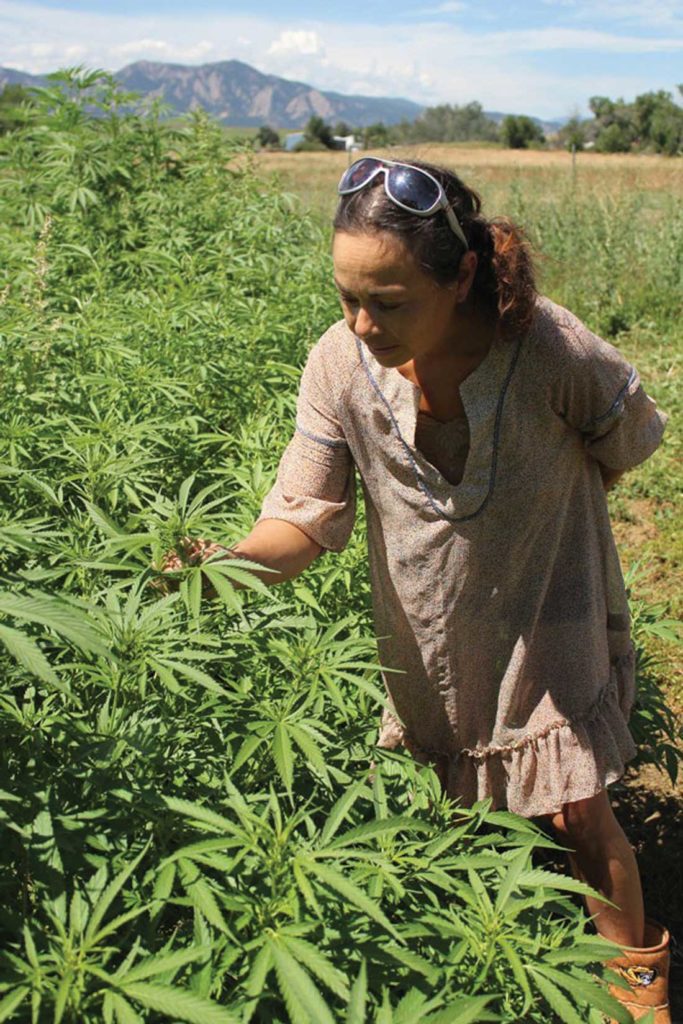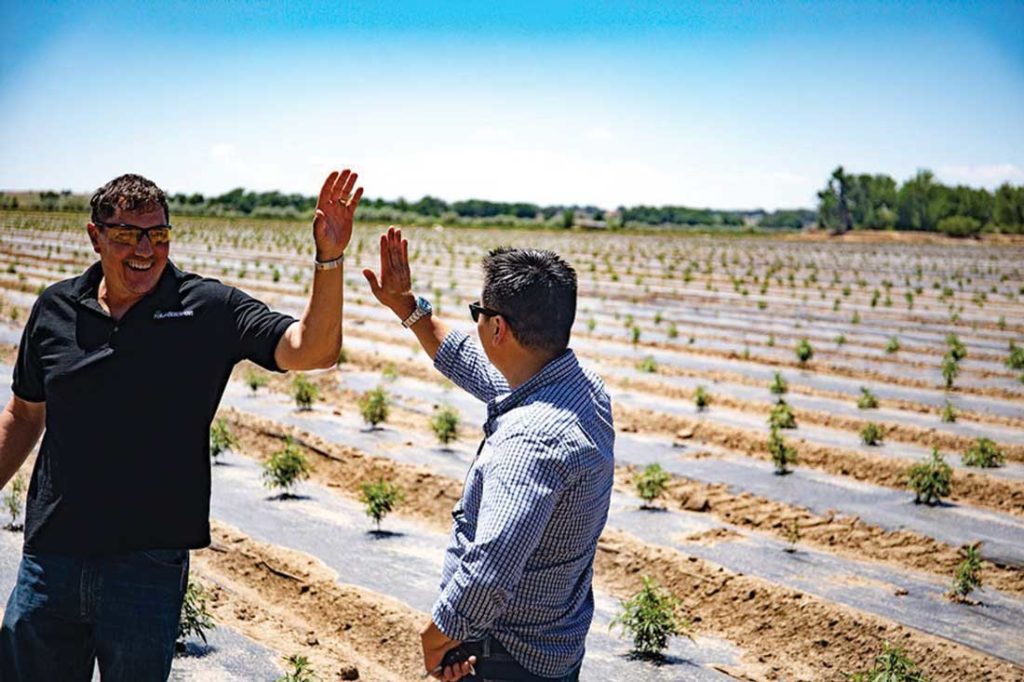Anyone even vaguely familiar with cannabis law knows it’s fraught with complications and contradictions. Now the legal status of cannabidiol – commonly known as CBD, the non-psychoactive medicinal compound derived from cannabis – has never been hazier.
The recently passed federal farm bill legalized hemp, but, combined with the U.S. Food and Drug Administration’s approval of the first-ever pharmaceutical drug containing CBD, it may actually pave the way for Big Pharma to take over the CBD market — and the rest of the medical marijuana market — nationwide.
On June 25, the FDA approved London-based GW Pharma’s Epidiolex, a drug containing CBD as its active ingredient, to treat two rare and severe forms of epilepsy, Lennox-Gastaut syndrome and Dravet syndrome, in patients 2 years old and older. On the surface, that may seem like a victory for medical marijuana (MMJ) advocacy, but, in reality, it only further muddies the legal status of CBD. In accordance with the Federal Food, Drug and Cosmetic Act, the FDA considers any product for human consumption containing the active ingredient (such as CBD) of an FDA-approved pharmaceutical drug (e.g., Epidiolex) “adulterated and misbranded,” according to a Q&A posted on the FDA website.
“This is just one more way that our products are illegal at the federal level,” said hemp farmer and activist Veronica Carpio.

There is an exception, the FDA Q&A states, “if the substance was ‘marketed as’ a dietary supplement or as a conventional food before the drug was approved. … However, based on available evidence, FDA has concluded that this is not the case for THC or CBD. … Interested parties may present the agency with any evidence that they think has bearing on this issue.”
Jonathan Miller, lead counsel for the U.S. Hemp Roundtable, a coalition of dozens of hemp companies and one of many hemp industry lobbying groups, said he’s been gathering such evidence and hopes to change the agency’s mind.
But for now, the FDA’s press release announcing the approval of Epidiolex made it clear they aren’t backing down from that position. “[W]e are prepared to take action when we see the illegal marketing of CBD-containing products with serious, unproven medical claims,” it reads in part. “Marketing unapproved products, with uncertain dosages and formulations, can keep patients from accessing appropriate, recognized therapies to treat serious and even fatal diseases.”
In fact, Stanley Brothers – the Colorado cannabis company best known for its high-CBD cannabis strain Charlotte’s Web, which is credited with helping children control seizures when conventional pharmaceuticals have failed – received a warning letter from the FDA last year regarding the medical claims made about the company’s CBD products. Stanley Brothers is one of the member companies represented by the Roundtable.
Now that Epidiolex has been approved, the FDA will prepare a “medical and scientific analysis” of the new drug for the U.S. Drug Enforcement Agency, which may then choose to move CBD from Schedule I in the Controlled Substances List to Schedule II-V, meaning only pharmaceutical companies, doctors, and pharmacists will be allowed to legally produce, prescribe, and distribute CBD, respectively, in compliance with federal law. Every step of the process would have to comply with FDA standards, and everyone in the supply chain (growers, extractors, retailers) would have to be registered with the DEA.
The DEA could also choose to create a new drug code exclusively for Epidiolex under Schedule II-V, DEA spokesperson Barbara Carreno explained, leaving all other forms of CBD just as federally illegal as they are now. That’s how the DEA chose to deal with Marinol, an FDA-approved drug containing synthetic THC, the main psychoactive compound in cannabis, and it could do the same with any other cannabis-based drugs the FDA approves in the future.
“There is precedent for regulating various compounds derived from the same plant differently,” Carreno said, noting the various opioids derived from poppies range from heroin in Schedule I to oxycodone and morphine in Schedule II to codeine cough syrups in Schedule V. The only thing that’s certain is that Epidiolex will not go in Schedule I because the FDA has confirmed that it has medical uses. Controlled substances in Schedule II through V are classified according to their risk of abuse and overdose, with Schedule II having the highest risk and V having the least.
Carpio, the hemp farmer and activist, believes the FDA approval of Epidiolex could give the federal government the strongest legal grounds yet to justify a crackdown on CBD (and cannabis in general) while simultaneously laying the groundwork for Big Pharma to take over the MMJ industry nationwide. Several other local hemp farmers share Carpio’s concerns.
“The pharmaceutical companies would have history on their side to say [CBD] is a product only they should be able to work with and produce and manufacture,” said Luke Johnson, founder and CEO of Cloud CO Farms in Alamosa, Colorado. “And the FDA could slap all these huge rules and regulations that have to be met to be approved to work with it.”
According to Justia.com, which makes legal records available to the public, GW also holds roughly 100 patents related to the medical efficacy of cannabis, covering cannabinoid extraction processes, cannabinoid placebos, dispensing mechanisms for cannabinoid drugs, and a range of cannabinoid-based drug formulas used to treat almost everything imaginable, including schizophrenia, mood disorders, epilepsy, Alzheimer’s disease, psychosis, bone disorders, inflammatory bowel diseases (e.g., Crohn’s disease), tumors, bulimia, obesity, and several types of cancer. Each patent potentially provides another legal avenue for GW to shut down its competitors already operating under state hemp and MMJ programs like Colorado’s.
“I think the whole way GW set this thing up is to have a monopoly,” said Dani Billings, owner of LoCo Farms in Longmont and co-founder of the Colorado Hemp Project. “They want everybody underneath their hand.”
GW also championed a bill last legislative session that allows doctors in Colorado to prescribe medications derived from cannabis if they are FDA-approved (e.g., Epidiolex). That bill passed the Colorado Legislature with 94 votes (out of 100 votes total in the House and Senate) in favor and was signed into law by then-Gov. John Hickenlooper on June 4, opening a loophole for GW around another Colorado law that prevents doctors from prescribing “marijuana” to patients.
The Cannabist, a marijuana and hemp edition of The Denver Post, reports that “forecasts have put Epidiolex’s peak annual sales between $1 billion and $3 billion.”
Epidiolex is expected to cost between $2,500 and $5,000 per month, according to analysts consulted by The New York Times, yet local medicinal hemp farmer Jan VanDenBerg says her products could deliver the same dosage of CBD for roughly a tenth of those prices. Unlike other CBD and MMJ products, however, Epidiolex may be covered by private health insurance, but the ever-rising costs of insurance may create only another barrier to access.
Fortunately for those in the local CBD business, the Colorado Hemp Foods Bill was signed into law earlier this year, and it takes the exact opposite position of the FDA, asserting explicitly that CBD is a dietary ingredient and products containing it should be regulated as food products. Carpio, who helped draft and advocate for the bill, said it could be a turn-key solution for all the other states to copy, including Texas, to protect their CBD markets from the feds.
Defense attorney and first chair of the Colorado Bar Association’s Cannabis Law Committee Lenny Frieling said the law may protect Colorado from an FDA or DEA crackdown on CBD on the basis of states’ rights, but it could take a lawsuit, or several, to finally sort it out.
*****
The difference between regulating CBD as a drug or a food is a massive one for farmers like Johnson and his family, who own and operate Cloud CO Farms.
Cloud CO grows and extracts CBD from medicinal hemp and has been working on plans to begin producing and retailing their own CBD products as well, but if CBD becomes regulated as a drug, those plans will be dashed. Unable to bear the costs of bringing their CBD extraction facilities up to FDA standards, Johnson said Cloud CO would likely have to stick to growing hemp only and contract out their CBD extraction and the production of their products to an FDA-compliant facility.
Other companies, however, have been preparing for that eventuality. Stratos, a cannabis company based in Pueblo West, already produces THC- and CBD-infused products using pharmaceutical-style FDA-approved methods at their manufacturing facility. And Folium BioSciences, headquartered in Colorado Springs, is currently going through the certification process to become approved to produce pharmaceutical-grade phytocannabinoid products with the Colorado Department of Public Health and Environment, which has standards that mirror the FDA’s.
“Whatever the delivery system is, we’ll be prepared to meet those demands,” said Folium spokesperson Juanita Ramos, who helped advocate for the Hemp Foods Bill and agrees with Johnson and Carpio that CBD should be regulated as a food product, but Folium’s leadership wants to be prepared for any eventuality.
“All we can do is keep our heads down and keep doing what we do,” she said. “We’re concentrating on those kids and people who need” CBD.
Johnson said regulating CBD as a pharmaceutical substance would be a betrayal of “the small business owners and farmers who have already put in millions and millions of dollars and sacrificed a lot of time and effort to get the industry to the point where it is today.
“They would get crushed by something like that,” Johnson continued, “so it would be pretty hypocritical to see something like that happen, but that wouldn’t come as a surprise at the same time. The hypocrisy is kind of peaking right now.”
CBD producers and sellers here in Fort Worth are facing the same uncertain future, but unlike Colorado, Texas has no Hemp Foods Bill with which to challenge the feds if the FDA decided to enforce the rule that only pharmaceutical houses with approved drugs on the market could sell products with CBD in them. Should that occur, dozens of local vape and smoke shops – which now include CBD oils in their inventory, as well as three Fort Worth CBD specialty stores – would be instantly shut out of the market.
That is unlikely to happen. In a June 25 press release from the FDA, Commissioner Scott Gottlieb indicated that the administration would take action primarily against CBD suppliers and manufacturers making medical claims: “We are prepared to take action when we see the illegal marketing of CBD-containing products with serious, unproven medical claims.”
A spokesperson for the FDA, Michael Felberbaum, told us that the FDA had already “taken issue with products making particular medical claims.”
He pointed to warning letters that had been sent out to more than two dozen CBD producers and retailers since 2015. The letters are supposed to encourage the recipients to voluntarily fall in line with FDA standards — in this case, removing medical claims from the products — but noncompliance can be met with a host of serious consequences, from product forfeiture to shutting down entire businesses.
Neither American Shaman nor Rawsome, Fort Worth’s first two CBD shops, market their products as medicines. American Shaman, which opened in April 2018, bills itself as a health and beauty shop and carries CBD-infused body creams and lotions along with consumable CBD products, which are sold as general health tonics. Rawsome, which opened in June 2017, markets itself as a vitamin and supplement store, which should keep both of them under the FDA’s radar.
Still, the FDA’s approval of Epidiolex has sent a chill through the industry, including the Fort Worth stores. While the owners of both stores were more than willing to discuss their products and the future of their industry, they fell silent the minute the FDA’s active ingredient rule was introduced into the conversation. Repeated attempts to get them talking about the possible repercussions of the approval of GW Pharmaceuticals’ CBD product were met with silence. Lora Gollahon, owner of American Shaman, referred us to her parent company, which has the same name, but they did not respond to emails. Andrew Clarkson, founder of Rawsome, did not respond to several calls or emails on the topic.
“Everybody is nervous,” said an employee at one of the stores who asked not to be identified. “Nobody will talk with you because they don’t want the FDA to notice them.”
The owners of Fort Worth’s newest CBD store, Thrive Apothecary — a bright, airy space filled with colorful, splashy paintings — have a different take on the issue. Trey Phillips, a recently retired cop who served as a SWAT team leader, and wife Lisa Garner-Phillips, a board-certified OBGYN who now specializes in hormone replacement and aesthetic procedures, opened their store on Carroll Street in October.
“I’m a retired Fort Worth police officer, and my wife is a doctor, so we’re trying to bring some legitimacy to the CBD world,” Phillips told us on a recent visit to the store. “A lot of people think CBD is just something for stoners. They don’t know what it is at all, and we’re trying to change that.”

As an example, he presented me with a copy of a January 8 Fort Worth police memo that bans officers from using CBDs.
“A lot of officers are upset with that, because it helps with anxiety, insomnia, and other issues related to the job, and now they don’t have the option of using it,” Trey said. “I think that’s very wrong. I think the administration is just regurgitating bad information.”
The Phillipses understand that CBD cannot be advertised as medicine, so they sell themselves as “an holistic lifestyle store dedicated to bringing wellness to the world through plant-based products from high-quality industrial hemp.”
Those products include edibles, wellness oils, hair-skin-body lines, and pet products. The hemp used to make the CBD products they sell comes primarily from Colorado, Vermont, and Connecticut.
Asked whether the FDA’s recent ruling that despite hemp being legalized nationally as an agricultural crop, CBDs remain illegal, Phillips thought for a moment.
“Will the Fort Worth police department prioritize stores selling something that a mom needs for her kid with epilepsy, or will they prioritize the heroin and crack dealers?” he asked. “I think they will make the right decision and leave us alone.”
*****
All of the Colorado hemp farmers that we spoke with agree that, rather than being put in a new drug schedule, CBD should be removed from the list of controlled substances entirely because it carries little to no risk of abuse or overdose.
“Descheduling will really open it up to anyone who wants to participate, and they wouldn’t have burdensome requirements that they have to follow because it will be treated as a regular agricultural crop,” Johnson said. “That would finally allow farmers and producers to operate in a more fair and competitive landscape to all the international people that we compete with currently.”
Senate Majority Leader Mitch McConnell was responsible for an amendment in the sprawling Farm Bill that removed “hemp” from the definition of “marihuana” in the Controlled Substances Act and that defines hemp as “the plant Cannabis sativa L. and any part of that plant, including the seeds thereof and all derivatives, extracts, cannabinoids, isomers, acids, salts, and salts of isomers, whether growing or not, with a delta-9 tetrahydrocannabinol concentration of not more than 0.3 percent on a dry weight basis.”

Miller and Colleen Lanier, a spokesperson for the Hemp Industries Association, a trade group, believe that that language should be sufficient to protect all hemp-derived CBD products from federal interference.
Carpio disagrees, however, pointing out a paragraph of the amendment added in committee: “(b) EFFECT ON OTHER LAW. –– Nothing in this subtitle shall affect or modify –– (1) the Federal Food Drug and Cosmetic Act (21 U.S.C. 301 et seq.); or (2) the authority of the Commissioner of Food and Drugs and the Secretary of Health and Human Services under that Act.”
Combined with the approval of Epidiolex, Carpio said that that paragraph turns the bill from a victory gift for the CBD industry into a Trojan Horse. Frieling agrees with Carpio’s interpretation of that paragraph but said it’s impossible to know exactly how the FDA will go about enforcing the FD&C Act in regard to CBD.
Miller, an attorney, believes the FDA’s enforcement efforts regarding CBD will be focused only on companies making unproven medical claims about their products, which he fully supports, rather than a full-blown crackdown. “I just don’t see the FDA getting into that battleground,” he said.
Miller believes there should be two paths available for consumers to access CBD — as a pharmaceutical drug or as an over-the-counter food product or supplement — and if the FDA tries to block the latter path, he and the Roundtable will be prepared to sue. “We haven’t made our case yet because we don’t need to,” Miller said, “but if we have to, we will.”
But Carpio is highly skeptical of both the Hemp Industries Association and the U.S. Hemp Roundtable’s sincerity, pointing out the former opposed the Colorado Hemp Foods Bill and the latter represents several large companies, some of them foreign, that already have the facilities and resources to produce CBD products in compliance with FDA pharmaceutical standards.
“They claim to represent the small farmers, but they don’t,” Carpio said, also noting that it costs $25,000 a year to be on the Roundtable’s board of directors and $10,000 for voting rights in the organization. “They’re a pay-to-play group trying to control the message, and it’s a deceptive message.”
Miller said all of the companies represented by the Roundtable either have headquarters or subsidiaries in the United States and “have a significant stake” in the American hemp market.
But Carpio said the FDA wouldn’t have to crack down on, nor would GW have to sue, every company making CBD products — going after a few big companies, like Stanley Brothers, could be enough to scare off smaller ones that can’t afford to become tied up in litigation.
*****
McConnell’s amendment also contained a provision prohibiting convicted drug felons from participating in the hemp industry — a move Carpio called outrageous and discriminatory, pointing out that people of color are disproportionately convicted of drug crimes in the United States. Carpio herself was convicted of a felony for possessing marijuana in 2012.
“That’s double jeopardy,” she said. “I already got punished. I’m going to challenge that. Somehow, I’m going to find a way to fight it. I’d like to see a jury convict me for growing hemp. I’d like to see a jury convict me for growing something completely harmless.”
Ramos believes everyone is being lumped into one group: “If you smoke weed, you might as well be doing heroin. They’re talking about people like [Carpio]. … They want to cut her out of the industry? After everything she’s done to move the industry forward? No, I don’t agree with that.”
Billings believes everyone deserves a second chance: “A lot of those [felonies] are silly marijuana charges, and that shouldn’t keep anyone from working with hemp. It isn’t even a drug, anyway. It doesn’t get you high. … This is going to change people’s lives for the better everywhere.”
Billings believes hemp could be the crop that brings success and stability back to family farms across the country, especially because of its versatility. Hemp can be used to produce everything from biodegradable plastics and building materials to textiles and rope to food, medicine, and biofuels.
“This plant is here to do good, to be a positive conscious force,” Billings said. “Everybody has health issues. Everybody needs houses. Everybody needs clothes, and everybody needs food. And this plant can take care of all of that. Once this plant has an opportunity to touch people’s lives, Lord, does it make a change.”
Billings was one of the first Colorado farmers to begin growing hemp after the 2014 Farm Bill authorized states, through their departments of agriculture or universities, to create industrial hemp programs for research. Today, more than 40 states — Texas is not among them — have passed legislation creating such programs, and 19 are now actually producing hemp, according to Lanier at the Hemp Industries Association.
Fort Worth Weekly writer Peter Gorman contributed to this story that was originally published in the Colorado Springs Independent.












